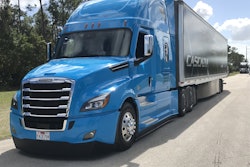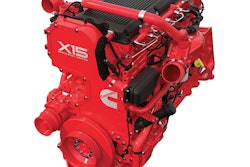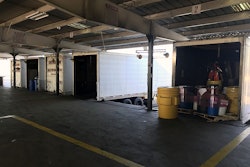This is the third and final installment of a 3-part series. Part one explained the underwriting process. Part two covered the impact of driver hiring and training on insurance premiums.
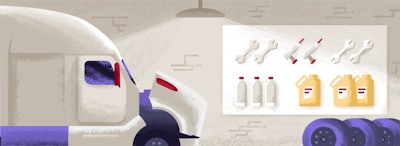
If drivers are the lifeblood of your company, then trucks are its backbone. Each rig hauls more than just cargo. They carry the vision your business has set out to fulfill every time they head out on the open road. Trucks are mammoth mechanical masterpieces. But massive size significantly increases the damage and injury they can cause.
According to the Federal Motor Carrier Safety Administration, semi-truck accidents cost $20 billion in 2017. Nearly half of that amount was paid out to victims who suffered a diminished quality of life. Depending on the outcome, truck accidents can cost in the millions of dollars in property damage and bodily injury.
 Wade Millward is chief marketing officer, transportation division, of Millward Agency, a family-owned and operated insurance agency in Provo, Utah.
Wade Millward is chief marketing officer, transportation division, of Millward Agency, a family-owned and operated insurance agency in Provo, Utah.Insurance companies pay out the bulk of truck accident claims. Through decades of investigations, they’ve learned proper maintenance and safety protocols go a long way to reduce accident severity and avoid certain types of accidents altogether. Because of this, they will also go out of their way to insure and reward trucking companies who take a proactive approach with vehicle maintenance and safety.
Maintenance
Your average automobile weighs in at 2.5 tons. The average tractor trailer tops 17 tons with the heaviest rigs tipping the scales at more than 40 tons. Stopping distances for trucks are nearly double that of your typical sedan and with a center of gravity much higher, rollover accidents are much more common; and costly.
While some accidents simply can’t be avoided, proper maintenance will help ensure your trucks are prepared to react in an emergency situation. Implementing a formal service schedule for each vehicle in your fleet (even private passenger vehicles) is critical in reducing or avoiding accidents.
Service schedules should include checking and replacing when recommended:
- Tires
- Fluids
- Lights
- Couplings
- Lines and wires
- Fuel/DEF tanks
- Gauges and dials
- Windshield wipers
The above is a short list of the items you should include in your regular maintenance program. Proper maintenance can also help avoid claims of negligence which often lead to higher settlement amounts. Provide your formal maintenance program and copies of service schedules to your independent insurance agent. This information can potentially reduce your premiums or improve coverage terms.
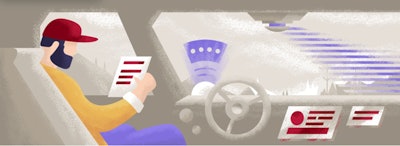
Technology
The amount of technology available to the trucking industry is growing on almost a daily basis. And insurance companies are taking notice. A few items that can assist in lowering your premium or help your defense in the event of a claim include:
Telematics – This technology provides real time driving data. The information collected can be used to improve driving habits and provide insight into the potential of accelerated wear and tear on your rigs. Many insurance companies offer up front discounts for fleets who install telematics on their rigs.
Sensors – There is a wide range of sensors you can install to provide a second set of eyes on the loads your rigs carry. Sensors can be used to register shifts in weight distribution, tire pressures, and temperature changes. Many are designed to alert drivers to safety hazards which ultimately help reduce accidents.
Cameras – A staple in countries across the pond, dashboard cameras are gaining in popularity here in the States. They capture video evidence to help your company in defense of accident claims. In addition to dashboard cams, new backup, side view, and even 360-degree camera systems are hitting the market to broaden the driver’s field of vision.
From a coverage standpoint, make your insurance company aware of any technology you install on your trucks so they are properly insured. Then ask if any discounts may be available.
Checklists
Prevention is worth a pound of cure, or in our industry, a pound of safety. Maintenance schedules and technology can only take you so far. Your drivers are the first line of defense when it comes to operating a safe fleet of rigs.
Every trucking company needs a standard set of checklists for their drivers to complete every time they are dispatched. Furthermore, management needs to ensure the checklists are being followed and reported back to them. There are three critical checklists your drivers should complete on every run:
- Walk-around checklist: Before each haul, drivers should inspect their rig and trailer for any mechanical issues that could jeopardize safe operation.
- Loading/Unloading checklist: Especially for special loads, a loading and unloading checklist will make sure neither truck nor cargo are damaged by making sure no step is overlooked.
- Post-delivery checklist: A lot can happen after a few hundred miles. After each completed delivery, a second walkaround of the rig and trailer will identify any potential safety concerns before they become a problem.
Drivers may balk at taking a few short minutes to complete a checklist. This is why it is important to have a disciplinary procedure in place that has some teeth to it. Checklists, coupled with a formal driver incentive and disciplinary program, will go a long way in your negotiations with insurance companies.
What’s Your Story?
Truck maintenance and safety protocols are part of your story to share with insurance company underwriters. They are looking for trucking companies who take safety seriously and will do everything they can to become a partner in your pursuit of building your business.
We hope our series will help you take the first step in creating a compelling story to tell your independent insurance agent. Not only will you likely save money on your commercial trucking insurance – you might just save a life.



